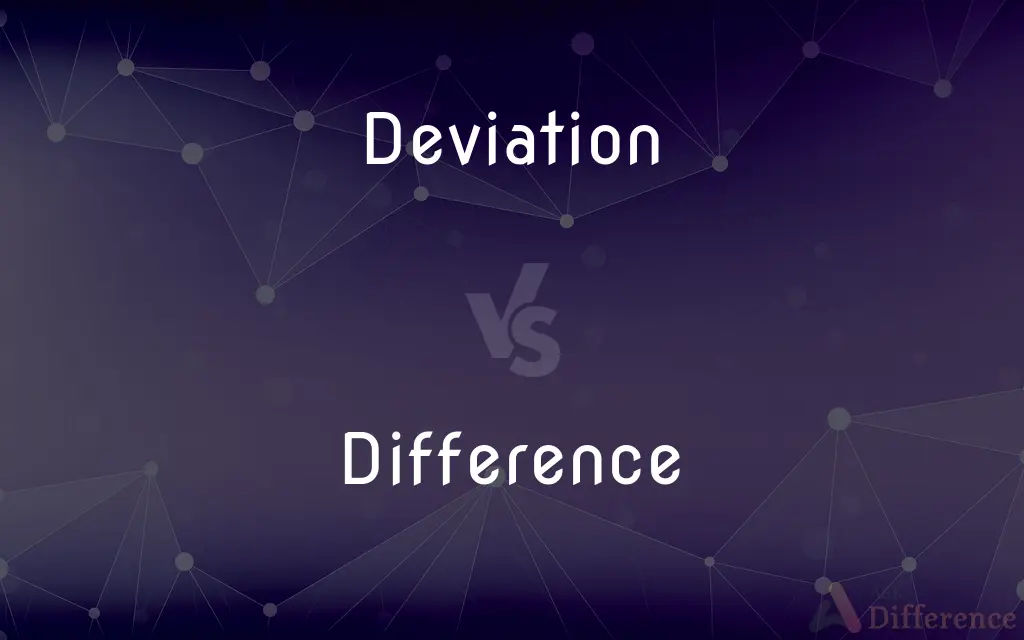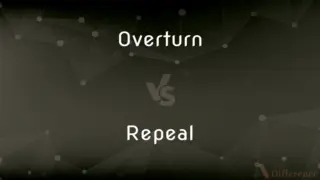Deviation vs. Difference — What's the Difference?
Edited by Tayyaba Rehman — By Fiza Rafique — Updated on March 29, 2024
Deviation highlights a departure from a standard or norm, while difference refers to the distinction or disparity between two entities or quantities.

Difference Between Deviation and Difference
Table of Contents
ADVERTISEMENT
Key Differences
Deviation is primarily associated with statistics and describes how far a set of numbers is from the norm or average. For example, in measuring the performance of a group of students, deviation helps understand how individual scores spread around the average score. Whereas, difference is a broader term used to denote the dissimilarity or variation between any two entities, not just numerical values. This could refer to differences in opinions, physical characteristics, or quantities.
In a statistical context, deviation is often used to calculate variance and standard deviation, which quantify the dispersion of a dataset. It's crucial for determining consistency within data. On the other hand, difference is a more generic term and can be applied in various contexts, such as mathematical operations (subtraction), comparisons between ideas, or distinguishing features between objects.
Deviation implies a comparison against a standard or expected value, highlighting the extent of variance from what is considered normal or average. This concept is widely used in quality control and research to identify outliers or anomalies. While difference, does not necessarily require a standard for comparison but simply identifies that a distinction exists.
In terms of usage, deviation tends to carry a more specific, often technical connotation, especially in fields like statistics, physics, and quality management. Whereas difference is a common term with a wide application across disciplines, making it a fundamental part of everyday language to describe diversity or disparity among things.
Moreover, deviation can also have a normative aspect, suggesting that straying from the norm is either undesirable or notable. This is especially relevant in social, behavioral, or quality contexts. Difference, however, is value-neutral and does not imply a judgment about the entities being compared. It simply acknowledges that they are not the same.
ADVERTISEMENT
Comparison Chart
Definition
A measure of the extent to which a value differs from a standard or average.
The distinction or disparity between two entities or quantities.
Context
Primarily statistical and technical.
Broad, applicable in various fields.
Implication
Often suggests a departure from what is normal or expected.
Indicates a neutral distinction without implying normalcy.
Measurement
Quantified as variance or standard deviation in statistics.
Can be qualitative or quantitative, depending on the context.
Example Usage
"The deviation from the mean temperature indicates climate change."
"The difference in opinions led to a heated debate."
Compare with Definitions
Deviation
A statistical measure that quantifies the dispersion of data points.
The standard deviation provides insight into the data's spread from the mean.
Difference
A significant distinction between two things or people.
The cultural differences between the two countries are fascinating.
Deviation
A departure from the norm in behavior or belief.
The artist's style was a deviation from traditional practices.
Difference
A disagreement, dispute, or quarrel.
They settled their differences and resumed their friendship.
Deviation
The act of diverging from a usual or accepted standard.
Any deviation from the company's guidelines is strictly prohibited.
Difference
A change that alters a situation or condition.
The new policy made a significant difference in public opinion.
Deviation
In physics, the deflection of a wave or particle from its course.
The deviation of the light path in a prism creates a spectrum.
Difference
The remainder left after subtraction of one value from another.
The difference in scores was just three points.
Deviation
The difference between an observed value and the expected value.
The deviation in results prompted a review of the experimental procedures.
Difference
The quality or condition of being unlike or dissimilar.
Deviation
The amount by which a single measurement differs from a fixed value such as the mean
A significant deviation from the average value
Difference
An instance of disparity or unlikeness
There is a big difference in sound between a clarinet and an oboe.
Deviation
The deflection of a ship's compass needle caused by iron in the ship.
Difference
A degree or amount by which things differ
A difference in height of three inches.
Deviation
The act of deviating or turning aside.
Difference
A noticeable change or effect
Exercise has made a difference in her health.
Deviation
An instance of this
"We made so many deviations up and down lanes ... that I was quite tired, and very glad, when we saw Yarmouth" (Charles Dickens).
Difference
A disagreement or controversy
Let's settle our differences.
Deviation
Divergence from an accepted idea, policy, or norm of behavior
"Freud, as the leader of a powerful new movement, could not bear much deviation from his own central ideas" (Joseph Epstein).
Difference
Discrimination in taste or choice; distinction
In this case, the law should make no difference between young and old.
Deviation
An instance of this; an abnormality or departure from a norm
"Vice was a deviation from our nature" (Henry Fielding).
Difference
The amount by which one quantity is greater or less than another.
Deviation
Deflection of a compass needle caused by local magnetic influence, especially on a ship.
Difference
The amount that remains after one quantity is subtracted from another.
Deviation
(Statistics) The difference, especially the absolute difference, between one number in a set of data and the mean of that set of data.
Difference
To distinguish or differentiate.
Deviation
The act of deviating; wandering off the correct or true path or road.
Difference
(uncountable) The quality of being different.
You need to learn to be more tolerant of difference.
Deviation
A departure from the correct way of acting.
Difference
(countable) A characteristic of something that makes it different from something else.
There are three differences between these two pictures.
Deviation
The state or result of having deviated; a transgression; an act of sin; an error; an offense.
Mankind’s deviation from divine will
Difference
(countable) A disagreement or argument.
We have our little differences, but we are firm friends.
Deviation
A detour in a road or railway.
Difference
Significant change in or effect on a situation or state.
It just won't make much difference to me.
It just won't make much of a difference to anyone.
Deviation
(aviation) A detour to one side of the originally-planned flightpath (for instance, to avoid weather); the act of making such a detour.
Difference
(countable) The result of a subtraction; sometimes the absolute value of this result.
The difference between 3 and 21 is 18.
Deviation
(contract law) The voluntary and unnecessary departure of a ship from, or delay in, the regular and usual course of the specific voyage insured, thus releasing the underwriters from their responsibility.
Difference
(obsolete) Choice; preference.
Deviation
(Absolute Deviation) The shortest distance between the center of the target and the point where a projectile hits or bursts.
Difference
(heraldry) An addition to a coat of arms to distinguish two people's bearings which would otherwise be the same. See augmentation and cadency.
Deviation
(statistics) For interval variables and ratio variables, a measure of difference between the observed value and the mean.
Difference
(logic) The quality or attribute which is added to those of the genus to constitute a species; a differentia.
Deviation
(metrology) The signed difference between a value and its reference value.
Difference
(logic circuits) A Boolean operation which is true when the two input variables are different but is otherwise false; the XOR operation ().
Deviation
The act of deviating; a wandering from the way; variation from the common way, from an established rule, etc.; departure, as from the right course or the path of duty.
Difference
(relational algebra) The set of elements that are in one set but not another ().
Deviation
The state or result of having deviated; a transgression; an act of sin; an error; an offense.
Difference
To distinguish or differentiate.
Deviation
The voluntary and unnecessary departure of a ship from, or delay in, the regular and usual course of the specific voyage insured, thus releasing the underwriters from their responsibility.
Difference
The act of differing; the state or measure of being different or unlike; distinction; dissimilarity; unlikeness; variation; as, a difference of quality in paper; a difference in degrees of heat, or of light; what is the difference between the innocent and the guilty?
Differencies of administration, but the same Lord.
Deviation
The difference between an expected value of an observation or measurement and the actual value.
Difference
Disagreement in opinion; dissension; controversy; quarrel; hence, cause of dissension; matter in controversy.
What was the difference? It was a contention in public.
Away therefore went I with the constable, leaving the old warden and the young constable to compose their difference as they could.
Deviation
A variation that deviates from the standard or norm;
The deviation from the mean
Difference
That by which one thing differs from another; that which distinguishes or causes to differ; mark of distinction; characteristic quality; specific attribute.
The marks and differences of sovereignty.
Deviation
The difference between an observed value and the expected value of a variable or function
Difference
Choice; preference.
That now he chooseth with vile differenceTo be a beast, and lack intelligence.
Deviation
The error of a compass due to local magnetic disturbances
Difference
An addition to a coat of arms to distinguish the bearings of two persons, which would otherwise be the same. See Augmentation, and Marks of cadency, under Cadency.
Deviation
Deviate behavior
Difference
The quality or attribute which is added to those of the genus to constitute a species; a differentia.
Deviation
A turning aside (of your course or attention or concern);
A diversion from the main highway
A digression into irrelevant details
A deflection from his goal
Difference
The quantity by which one quantity differs from another, or the remainder left after subtracting the one from the other.
Difference
To cause to differ; to make different; to mark as different; to distinguish.
Thou mayest difference gods from men.
Kings, in receiving justice and undergoing trial, are not differenced from the meanest subject.
So completely differenced by their separate and individual characters that we at once acknowledge them as distinct persons.
Difference
The quality of being unlike or dissimilar;
There are many differences between jazz and rock
Difference
A variation that deviates from the standard or norm;
The deviation from the mean
Difference
A disagreement or argument about something important;
He had a dispute with his wife
There were irreconcilable differences
The familiar conflict between Republicans and Democrats
Difference
A significant change;
The difference in her is amazing
His support made a real difference
Difference
The number that remains after subtraction; the number that when added to the subtrahend gives the minuend
Common Curiosities
How do standard deviation and mean deviation differ?
Standard deviation squares the differences before averaging, while mean deviation takes the absolute value of differences.
Can deviation be negative?
Yes, deviation can be negative if the value is below the mean or standard.
Is difference always a numerical value?
No, difference can be qualitative, indicating dissimilarity, or quantitative, representing a numerical disparity.
What does deviation mean in statistics?
In statistics, deviation refers to how far data points are from the mean or average of the dataset.
Does deviation always indicate a problem?
Not necessarily; deviation can be natural or expected variation within data.
Can the difference be zero?
Yes, the difference can be zero if the two entities being compared are identical in the context of the comparison.
How is difference used in mathematics?
In mathematics, difference is the result of subtracting one number from another.
Why is measuring deviation important in research?
It allows researchers to understand the variability in data, which is crucial for drawing reliable conclusions.
How do differences in viewpoints impact decision-making?
Varied viewpoints can lead to more comprehensive decision-making by incorporating diverse perspectives.
Is deviation applicable only in statistics?
While commonly used in statistics, deviation also applies in fields like physics and quality control.
How can differences enrich a society?
Differences in culture, opinion, and perspective can lead to creativity, innovation, and broader understanding.
Can difference imply similarity?
Discussing differences often highlights underlying similarities, as it brings comparative aspects into focus.
What role does deviation play in quality control?
Deviation helps identify products or processes that fall outside acceptable limits, ensuring quality.
Why is acknowledging differences important in education?
Recognizing and valuing differences can create more inclusive and effective educational environments.
What does a high deviation indicate about a dataset?
A high deviation indicates that the data points are widely spread out from the mean, suggesting high variability.
Share Your Discovery

Previous Comparison
Overturn vs. Repeal
Next Comparison
Traditional vs. EthnicAuthor Spotlight
Written by
Fiza RafiqueFiza Rafique is a skilled content writer at AskDifference.com, where she meticulously refines and enhances written pieces. Drawing from her vast editorial expertise, Fiza ensures clarity, accuracy, and precision in every article. Passionate about language, she continually seeks to elevate the quality of content for readers worldwide.
Edited by
Tayyaba RehmanTayyaba Rehman is a distinguished writer, currently serving as a primary contributor to askdifference.com. As a researcher in semantics and etymology, Tayyaba's passion for the complexity of languages and their distinctions has found a perfect home on the platform. Tayyaba delves into the intricacies of language, distinguishing between commonly confused words and phrases, thereby providing clarity for readers worldwide.













































